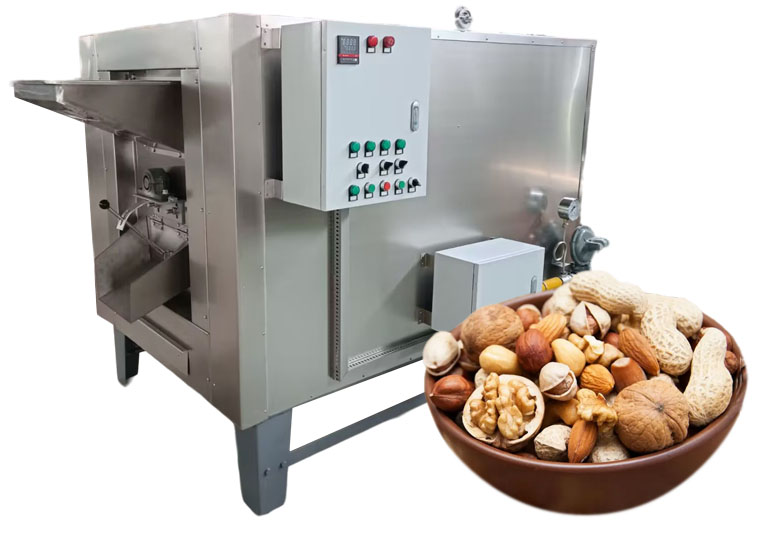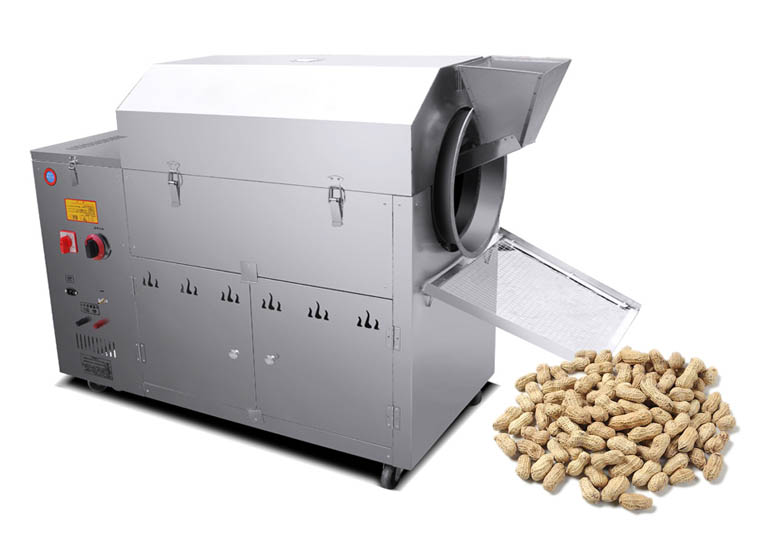Peanut roasting is both an art and a science, requiring precise control of temperature and roasting time to achieve the perfect balance of flavor, texture, and nutritional quality. Whether you are a small-scale artisanal producer or a large-scale industrial processor, understanding how peanut roasting machines influence the roasting process is crucial for delivering high-quality products.

The Importance of Precise Roasting Time in Peanut Processing
The roasting process transforms raw peanuts into crispy, delicious snacks by triggering the Maillard reaction, a chemical process that enhances flavor and color. However, this reaction is highly sensitive to time and temperature.
- Under-roasting can result in soft peanuts lacking crispness and may retain unnecessary moisture, thereby shortening shelf life.
- Over-roasting can cause excessive browning, produce bitterness, and even form harmful compounds like acrylamide, which can affect taste and food safety.
Since peanuts contain natural oils, prolonged exposure to high temperatures can also cause oil rancidity, further reducing quality. Therefore, optimizing the roasting time of peanut roasting machines is crucial for ensuring consistent product quality and consumer satisfaction.
Factors affecting peanut roasting machine roasting time
Several variables influence peanut roasting time, and understanding these variables can help optimize the roasting process:
1. Peanut variety and size
Larger peanuts (e.g., Virginia peanuts or Runner peanuts) require longer roasting times to ensure even heat penetration.
Smaller peanuts (such as Spanish or Valencia peanuts) roast faster and may require shorter roasting times to prevent burning.
2. Moisture Content
Freshly harvested peanuts have higher moisture content and require longer roasting times to remove excess moisture and achieve a crisp texture. Pre-drying peanuts before roasting helps standardize the roasting process.
3. Roasting Machine Type and Heat Distribution
Drum roasting machines provide uniform heat circulation but may require speed adjustments to prevent uneven roasting.
Fluidized bed roasters use hot air for faster and more uniform roasting but require precise temperature control.
Batch roasters vs. continuous roasters — Batch roasting systems allow manual adjustments per load, while continuous systems require calibration to ensure consistent output.
4. Temperature Settings
Most peanut roasters operate at temperatures between 140°C and 180°C (284°F to 356°F). Higher temperatures can shorten roasting time but increase the risk of burning; lower temperatures require longer roasting times but are easier to control.
5. Desired Roasting Level
Light Roast (8–12 minutes): Mild flavor with a slight crispiness.
Medium Roast (12–15 minutes): Balanced texture with optimal crispiness.
Dark Roast (15–20 minutes): Rich smoky flavor, but over-roasting may result in bitterness.

How advanced peanut roasters enhance consistency
Automatic temperature and time control ensure repeatability across batches.
Real-time humidity sensors dynamically adjust roasting parameters.
Data logging systems track each roasting cycle, enabling operators to optimize settings for different peanut varieties.
These innovations minimize human error and maximize efficiency, making them an indispensable part of commercial peanut processing.
Best Practices for Optimizing Roasting Time
- Preheat the roaster—ensure stable temperatures from the start.
- Conduct small-batch tests—help determine the ideal roasting time for new peanut varieties.
- Monitor color and aroma—visual and olfactory cues complement machine settings.
- Cool immediately after roasting—stop the cooking process to preserve texture.
Precision Roasting for Superior Peanut Quality
Mastering roasting time in peanut roasting machines is key to producing high-quality peanuts with optimal flavor, texture, and shelf life. By considering factors such as peanut size, moisture content, and machine performance, producers can adjust the process to achieve maximum efficiency and consistency.
Investing in advanced roasting technology not only enhances product quality but also strengthens market competitiveness. Whether for snack production, peanut butter manufacturing, or culinary applications, precise roasting is the foundation of exceptional quality in the peanut industry.




